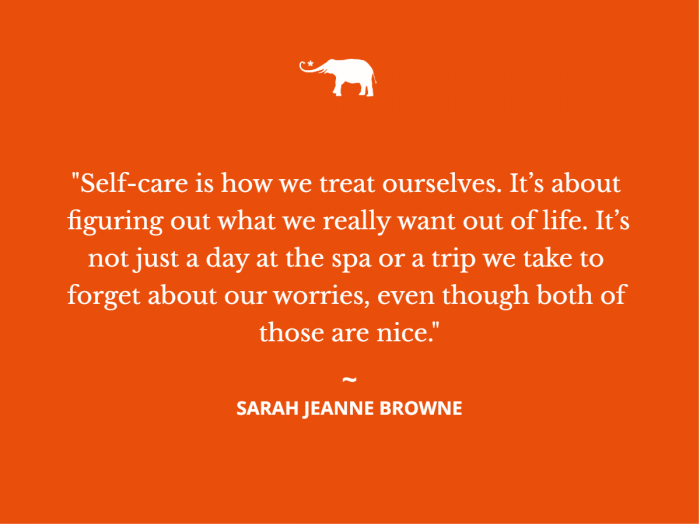View this post on Instagram
“Loving ourselves works miracles in our lives.” ~ Louise Hay
~
Loving yourself will change your life.
In fact, some could say it works like a miracle. Your perspective changes, your attitude becomes better, you accomplish more, and you help others.
When you rise, you lift up others enough to make a difference in the world.
The relationship you have with yourself is the most important one you have. It’s the one you can fall back on when everything else goes wrong. It’s a foundation for everything you do and become.
It can be truly miraculous when we decide to be all that we can be and love ourselves. Limitlessly.
It starts with a simple step of trusting yourself or your gut. You have to spend time with yourself to cultivate a knowing of what you want. And a healthy relationship entails wanting what is best for you, which can sometimes be hard to see.
Trust Yourself to Know What You Want
Trusting yourself is about honoring your thoughts and feelings, specifically your gut feeling or instincts.
Your gut feeling is a powerful one. Sometimes, you’ll feel obligated to do something you don’t want to do. Well, I have a secret for you: you don’t owe anyone anything.
It also tells you when you should walk away. We do everything we can do to ignore that feeling. But in the wise words of Cheryl Strayed, “Go because you want to. Because wanting to leave is enough.”
Following your gut this way is so important…and impactful. You can decide anything you want in this world, but the greatest decisions come from instinct. If we just trust, we can bring about many things. As Steve Jobs had said in his Stanford commencement speech:
“Don’t let the noise of others’ opinions drown out your own inner voice. And most important, have the courage to follow your heart and intuition. They somehow already know what you truly want to become. Everything else is secondary.”
Live for You
“We repeat what we don’t repair.” ~ Christine Langley-O’Baugh
You can’t escape yourself. Even if you want to. Wherever you go, there you are…as the saying goes. That means, unless we face ourselves, we are susceptible to repeating the same mistakes. Don’t “fake it until you make it.”
Face it until you make it.
It’s also about how we get up again.
There is no shame in having something to mend in oneself or one’s being. In the brokenness, there can be beauty. It’s about loving yourself. It’s about living for you. Then, you can do anything.
Loving yourself starts with what you say to yourself. Treat yourself as you would your own best friend. If someone was going through a hard time, you would show them compassion. So, you must show yourself compassion too. Self-compassion starts in positive self-talk.
Positive self talk-is powerful.
“I can do it!” is the simplified version; however, you can say anything you like about yourself to yourself. In the same sense, you can choose your own attitude. It’s a free gift—and you give it to yourself with every thought you think, because it is a message.
Your power in this world starts with self-acceptance. It’s hard, but true. You need to let go in order to live. And you need to be thinking the right thoughts about yourself in order to get there.
You can record in some way the negative messages you are sending yourself and seek to analyze them. Where are they coming from? When do they most pop up? What am I thinking about when they do? This is also called Cognitive Behavioral Therapy. You can replace negative thoughts with radical self-love.
Overcoming negative thinking through positive self-talk is your prerogative; it is your miracle maker. It is how you most uphold a relationship with yourself that is healthy.
Self-Care Success
There’s a misconception that self-care is selfish. It’s not. In fact, you can’t pour water from an empty cup. If you are empty, you can’t give anything. May your cup be overflowing. Then, and only then can you truly give in the first place.
Self-care is how we treat ourselves. It’s about figuring out what we really want out of life. It’s not just a day at the spa or a trip we take to forget about our worries, even though both of those are nice.
Ask yourself, what do you want?
It may be difficult to answer, but it’s worth soul-searching for. It’s worth sacrificing for. It’s worth everything for.
Reward yourself when you work hard. Rest when you want to quit.
A reward doesn’t have to be anything costly or huge. It could be small. Offer yourself a compliment through positive self-talk. Take yourself somewhere nice. Read a good book. The type of reward is up to you, but pick one reward for your accomplishments.
Don’t forget to pace yourself. It’s the journey, not the destination. That means it’s about being right here, right now. Loving yourself is not always just about moving forward. It’s about seeing what you already have and what you can control.
“Self-love is remembering that I always have a choice in how I react and respond. That is the only thing I can control.” ~ Michelle McGrath
Exercises to cultivate self-love:
Exercise A: A Lesson in Control
Draw a large circle leaving space to write around it on a sheet of paper
On the inside of the circle, list what you can control.
On the outside, list what you cannot control.
For example, you can’t always control the opinions of others but you can control how you respond to them. Your reaction or attitude is always in your control.
Focus then on what you can control. This will decreases your worries and improve your self-care. Use this exercise as a go-to for when you feel lost or confused piled by trying to control what cannot be controlled. The greatest thing you can control is yourself. That should be in the middle of the circle. Underline it, highlight it, bold it, or even write it bigger in font.
“ME”—I can control myself.
If there aspects of your life you feel you cannot control, refer to the circle. It can be used as a daily reminder that you are always in control of something.
And when not, that’s when it’s time to ask for help.
Exercise B: A Love Letter To Myself
Write a letter to yourself based on the things you love about yourself.
For example, you can love the way you bounce back after something falls through or the way you tell silly dad jokes to the people you love. It can be deep or it can be simple. It’s your letter.
Writing a letter to yourself is a perfect tool for reminding yourself why you should already be happy. What are you most proud of? Foster that. Your resilience doesn’t mean you have to be perfect. In your imperfections and flaws, you can still see your beauty. You’ve overcome them as you’ve grown. And while you will never be perfect, you will always grow and be growing, and that is beautiful.
Your relationship with yourself is important. Make it a priority. Make yourself your number one fan. Learn to rely on this letter to remember what’s best about you in your worst times. It won’t let you down!
Exercise C: Journal How you Feel
Journal about what you feel each day; get to know yourself and pick up any patterns.
Journaling is a simple exercise that is rewarding. One way to journal is to “Name it to tame it.” When you are writing, identify your feelings, so you can cope with them. “Name it to tame it” is a common practice that includes labeling how you feel.
Labeling how you feel is an important first step to figuring out a solution to your problem. It also relieves tension and stress more as you journal your feelings and label them.
Simply sit with your feelings and know what they are and where they come from. Your feelings are nothing be to be ashamed of. You must set yourself free of fear of them. They have something to say. The longer you ignore them, the more you repress them. And that’s not self-love. Self-love is taking all of it—the good and the bad—about yourself, and still knowing your worth.
Build Yourself Up
Relying on others to build you up is a sure way to lose control of yourself. The reason? We cannot control what others say or do. What they say about us is no different. It causes codependence when we rely that way.
Codependence is when you seek fulfillment through someone other than yourself and when your well-being becomes dependent on theirs. That sets you up for unhealthy attachment rather than having healthy attachment through solid boundaries.
Boundaries don’t break us. They may cause you to breakup with someone if ignored. But they are actually codes of living. They are the foundation on which you build and they become what you most stand for.
When someone doesn’t respect our boundaries or we create unhealthy ones, we lose sight of our values as well as our own individuality. This is not good.
Boundaries are kind. They are about self-love. They are valuing yourself over others’ expectations. Boundaries don’t mean to put conditions on a relationship. But they do mean to put on standards.
When you have boundaries, you can better build yourself up. You have self-reliance. You can have healthier relationships—including the one with yourself.
That’s why knowing what you want is so important. Not knowing jeopardizes all of that.
Conclusion
Your self-care skills will be the reason you find what you’re looking for. It’s not selfish to love yourself. In fact, it’s the opposite.
By prioritizing yourself, you can better serve others. You have to recognize when you’re at your limits. You have to reach out for help when you need it. You have to take responsibility for who you are, what you feel, and most of all, what you want. What do you want? That is the question we keep coming back to. Only you can answer that.
You can be the one who sees your worth; don’t rely on external validation for it. You can be the one who sees all you have to offer. You can be the one who knows your strength. You can be the one who self-advocates for your needs. You can be the one who says “Yes!” to life and to yourself. You can start anytime.
In need of a miracle?
Love yourself.
~











Read 4 comments and reply